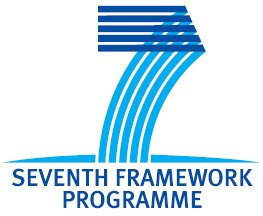- Details
- Hits: 969
High Performance Computing Centre (HLRS), University of Stuttgart - Germany
Ecole Polytechnique Fédérale de Lausanne - Switzerland
Europäisches Microsoft Innovations Center GmbH - Germany
Instituto de Telecomunicacoes-Pólo Aveiro - Portugal
 |
Dr. Rui Luis Aguiar holds a PhD from the University of Aveiro (2001). He is currently an associate professor at the University of Aveiro, and a Guest Professor at Carnegie Mellon INI. He is leading a research team at the Institute of Telecommunications, Aveiro, on next-generation network architectures and protocols. His current research interests are centered on the implementation of advanced wireless networks, systems, and circuits, with special emphasis on QoS and mobility aspects. He has been involved in European funded research since 1993, and has held technical responsabilities in many large projects, such as being the Chief Architect of the IST project Daidalos. He has more than 200 published papers in those areas. He is a Senior member of IEEE, a member of ACM, and has taken chairing responsibilities in several conferences, such as ICNS’05, ICT’06 and ISCC’07. MSc. João Paulo Barraca holds a Master from University of Aveiro (2006), where he currently holds an Invited Lecturer position. He has been a researcher inside Institute of Telecommunications for five years. He has extensive experience in European funded research, having participated in projects like Daidalos and WIP. He has been responsible for network stack changes in the framework of industry-funded projects, where solutions for reliable handover operation were required, and where optimized behavior for Service-Oriented-Architectures (specifically web based) was needed. He has more than a dozen papers published in networking and software engineer design. |
Scuola Superiore di Studi Universitari e di Perfezionamento Sant'Anna - Italy
 |
Giuseppe Lipari is Associate Professor of Computer Engineering at Scuola Superiore Sant'Anna. He is IEEE member since many years, and associate editor of IEEE Transactions on Computers. He is involved in many EU research projects (FRESCOR, RI-MACS, ARTIST 2, IRMOS) and national projects (ART-DECO, SensorNet). His research interests are in real-time systems, real-time operating systems, scheduling algorithms, embedded systems, and wireless sensor networks. Dhaval Giani is a research assistant at the Real-Time Systems Laboratory of Scuola Superiore Sant'Anna. He has a strong expertise in development inside the Linux kernel. He is working on techniques for the performance isolation of KVM virtual machinesby means of real-time scheduling. Juri Lelli is a PhD student at the Real-Time Systems Laboratory of Scuola Superiore Sant'Anna. His research interests fall in the field of real-time scheduling for General-Purpose Operating Systems. |
Computer Architecture for Embedded Systems (CAES), Universiteit Twente - the Netherlands









